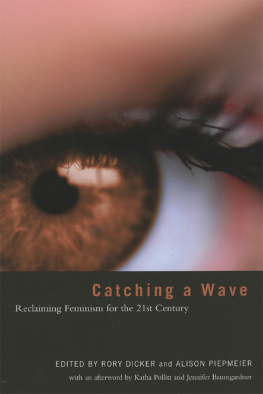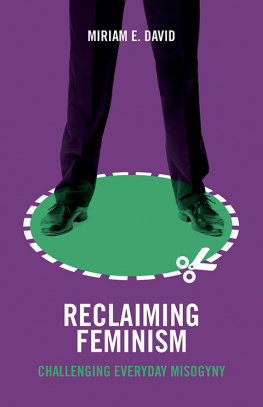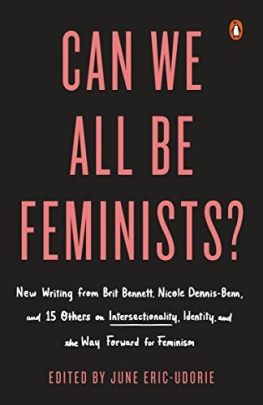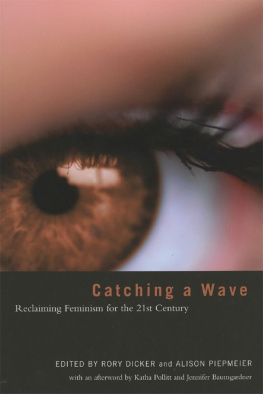Dicker - Catching a wave: reclaiming feminism for the 21st century
Here you can read online Dicker - Catching a wave: reclaiming feminism for the 21st century full text of the book (entire story) in english for free. Download pdf and epub, get meaning, cover and reviews about this ebook. City: Boston, year: 2004, publisher: Northeastern University Press, genre: Home and family. Description of the work, (preface) as well as reviews are available. Best literature library LitArk.com created for fans of good reading and offers a wide selection of genres:
Romance novel
Science fiction
Adventure
Detective
Science
History
Home and family
Prose
Art
Politics
Computer
Non-fiction
Religion
Business
Children
Humor
Choose a favorite category and find really read worthwhile books. Enjoy immersion in the world of imagination, feel the emotions of the characters or learn something new for yourself, make an fascinating discovery.
- Book:Catching a wave: reclaiming feminism for the 21st century
- Author:
- Publisher:Northeastern University Press
- Genre:
- Year:2004
- City:Boston
- Rating:4 / 5
- Favourites:Add to favourites
- Your mark:
- 80
- 1
- 2
- 3
- 4
- 5
Catching a wave: reclaiming feminism for the 21st century: summary, description and annotation
We offer to read an annotation, description, summary or preface (depends on what the author of the book "Catching a wave: reclaiming feminism for the 21st century" wrote himself). If you haven't found the necessary information about the book — write in the comments, we will try to find it.
A collection of original essays that calls for new voices to redefine feminism.
Dicker: author's other books
Who wrote Catching a wave: reclaiming feminism for the 21st century? Find out the surname, the name of the author of the book and a list of all author's works by series.
Catching a wave: reclaiming feminism for the 21st century — read online for free the complete book (whole text) full work
Below is the text of the book, divided by pages. System saving the place of the last page read, allows you to conveniently read the book "Catching a wave: reclaiming feminism for the 21st century" online for free, without having to search again every time where you left off. Put a bookmark, and you can go to the page where you finished reading at any time.
Font size:
Interval:
Bookmark:


Catching a Wave
reclaiming feminism for the 21st century
EDITED BY RORY DICKER & ALISON PIEPMEIER
NORTHEASTERN UNIVERSITY PRESS  BOSTON
BOSTON
Published by University Press of New England
Hanover and London
Northeastern University Press
Published by University Press of New England,
One Court Street, Lebanon, NH 03766
www.upne.com
2003 by Rory Dicker and Alison Piepmeier
All rights reserved. No part of this book may be reproduced in any form or by any electronic or mechanical means, including storage and retrieval systems, without permission in writing from the publisher, except by a reviewer, who may quote brief passages in a review.
Members of educational institutions and organizations wishing to photocopy any of the work for classroom use, or authors and publishers who would like to obtain permission for any of the material in the work, should contact Permissions, University Press of New England, One Court Street, Lebanon, NH 03766.
ISBN13: 9781555535704
ISBN10: 1555535704
ebook ISBN: 978-1-55553-856-9
Library of Congress Cataloging-in-Publication Data
Catching a wave : reclaiming feminism for the 21st century / edited by Rory Dicker and Alison Piepmeier.
p. cm.
Includes bibliographical references and index.
ISBN 1-55553-570-4 (pbk. : alk. paper)ISBN 1-55553-571-2 (cloth : alk. paper)
1. FeminismUnited States. 2. Young womenUnited StatesAttitudes. 3. WomenUnited StatesSocial conditions21st century. 4. Feminist theoryUnited States. 5. Social changeUnited States. I. Title: Reclaiming feminism for the 21st century. II. Dicker, Rory Cooke, [date]. III. Piepmeier, Alison.
HQ1426 .C284 2003
305.42'0973dc21 2002153489
Acknowledgments
 Any book is a collaborative effort, and this has certainly been the case with Catching a Wave. We have had much help in developing this book from its origins in a conversation we had after Rebecca Walker gave a talk at Vanderbilt. Along the way, we have attended regional and national conferences and symposia, conventions and panel discussions; in so doing, we have become part of a community of scholars and activists working on and in the third wave.
Any book is a collaborative effort, and this has certainly been the case with Catching a Wave. We have had much help in developing this book from its origins in a conversation we had after Rebecca Walker gave a talk at Vanderbilt. Along the way, we have attended regional and national conferences and symposia, conventions and panel discussions; in so doing, we have become part of a community of scholars and activists working on and in the third wave.
One of the wonderful fringe benefits of editing such a collection is the opportunity to get to know feminists in various fields from around the United States and Canada. Our contributors have been ideal, steadfastly revising based on our comments and undaunted by last-minute e-mail requests. They have taught us much about the third wave, and we feel lucky to have been able to work with them. Wed especially like to thank Jennifer Baumgardner and Amy Richards, who have shared their advice and experience and have consistently offered us generous assistance whenever we asked for it. Their willingness to advise us at the beginning of this projectwhen they didnt even know usdemonstrated for us their commitment to creating feminist community. Thanks to Jennifer Baumgardner for connecting us to a larger feminist community through her work with Katha Pollitt on the books afterword. We appreciate the time and care Jennifer and Katha took in crafting such an insightful coda to Catching a Wave.
Many people have helped us improve the text. Wed like to thank our two outside readers for Northeastern University Press for their helpful and thoughtful feedback. We also appreciate the suggestions of Walter Biffle, Alyssa Harad, Astrid Henry, Amanda Kinard, Deandra Little, Eliza McGraw, and Tracy Moore, all of whom offered thoughts and advice that helped shape the introduction. (It goes without saying, of course, that all flaws are ours alone.) Also, many thanks to Michael Ames for helping us when we first began the process of navigating the publishing world.
We have had a great deal of hands-on assistance throughout this process. We are grateful to Stacie Furia, Liz Royal, Jen Howard, Whitney Bullock, and Nikki Williams for their attention and care to the manuscript. We couldnt have done it without you. Thanks to Gayle Parrott for her enthusiasm, encouragement, and love. Thanks, too, to Ronnie Steinberg and Beth Conklin for their support, both personally and financially. A summer research award from Westminster College also helped to defray expenses.
We have been pleased to work with Elizabeth Swayze at Northeastern University Press; her enthusiasm for this project from our initial meeting has encouraged us as the project has progressed. She is a wonderful hands-on editor who has been available and supportive throughout this process. We would also like to thank Ann Twombly, the production director at Northeastern, for her careful and meticulous work during the production of the book. Her attention to detail has strengthened the book.
I (Rory) would like to acknowledge the many friends whose provocative conversation and (sometimes) outrageous behavior have challenged my feminism over the years: thanks go to Cathy Wasserman, Amanda Kinard, Laura Kinard, Lady Smith, Carol Manthey, Antonia Moser, Lucy Appert, and Rebecca Shapiro. I thank the many feminist mentors Ive been lucky to encounter and learn from, including the late Nancy A. Walker, Cecelia Tichi, Ronnie Steinberg, and, most recently, Carolyn Perry. My family has never stopped being a nurturing support system for me; I wouldnt be the person I am without the love of Ellen Dicker, Saul Dicker, Moira Mosco, John Dicker, Ella Mosco, and Alice Cooke. I also wouldnt be as sane, healthy, and happy without the love of Paul DeHart, a true friend. Finally, though, it is my great pleasure to thank Alison, whose humor, insight, and inspirations have reminded me what I love about scholarship and what scholarship should be about.
I (Alison) would like to thank the many wonderful feminists who have formed a community of love and political solidarity for me: thanks to Catherine Bush, Jay Crockett, Deandra Little, and Eliza McGraw. I have been fortunate to have teachers and mentorsincluding Cecelia Tichi, Ronnie Steinberg, Connie Hood, and Margery Hargrovewho have provided me with models of female empowerment. My students have been an inspirationI cant imagine a better job than getting to talk to them about feminism every day. Thanks to my family for everything they give me: to mom, who gets more radical as she gets older; to dad, who always points out sexist commercials; and to Trey and Aaron, whom I would like to publicly out as feminists. Thanks to Walter, who is working with me every day to forge a new kind of marriage, one that is as feminist as both of us. Finally, I am very grateful that my partner in this project has been Rory, who balances me out, attends to details I miss, laughs with me, and helps me to work through my personal and political life. Who knew when we started this project what good friends wed end up being?
RORY DICKER & ALISON PIEPMEIER
Introduction
As far as I can tell, the third wave is just the second wave with more lip gloss.
Young woman at the National Womens Studies Association conference, June 2001
 We are tired of waiting. Sick and tired.
We are tired of waiting. Sick and tired.
At Vanderbilt Universitys graduation ceremony in 2002, the top students in each of nine schools received awards. These were exceptional students whose accomplishments in scholarship, service, and leadership distinguished them from thousands of their peers who were also graduating on this day. Of these nine honorees, six were women. Presenting the awards were the deans of the students schools. Of these nine deans, two were womenunsurprisingly, they were deans of the education and nursing schools. The remaining seven deans were men.
Next pageFont size:
Interval:
Bookmark:
Similar books «Catching a wave: reclaiming feminism for the 21st century»
Look at similar books to Catching a wave: reclaiming feminism for the 21st century. We have selected literature similar in name and meaning in the hope of providing readers with more options to find new, interesting, not yet read works.
Discussion, reviews of the book Catching a wave: reclaiming feminism for the 21st century and just readers' own opinions. Leave your comments, write what you think about the work, its meaning or the main characters. Specify what exactly you liked and what you didn't like, and why you think so.









